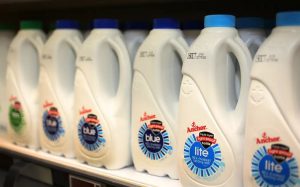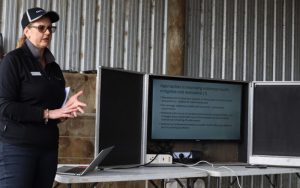
A scientist whose work on dairy cow urine nitrate concentrations was challenged by DairyNZ is standing by the work he and co-author Dr Jacqueline Rowarth released earlier this year.
Dr Graeme Coles and Rowarth had a peer-reviewed paper published by the NZ Institute of Agricultural and Horticultural Science in May. Their work significantly revises down the claimed figure of 1000kg of nitrate per hectare in cow urine.
Coles is an ex-Plant and Food Research scientist and spent a period researching feed and fibre products for the pig and poultry industry and has also overseen commercial nutrition startup companies.
Their research work put the loss as the equivalent of 240kg N a hectare.
The figure has become a critical one on the grounds that it impacts the calculations of the nutrient budget software Overseer.
It also underpins work on nitrate mitigation options, including the use of plantain pasture, which was challenged in a paper released in the NZ Journal of Agricultural Research this month.
The paper includes Rowarth and Coles’ challenge to the 1000kgN/ha figure.
In response to that, DairyNZ scientists maintained it was a non-peer-reviewed popular press article and refers to a very narrow range of studies to draw its conclusion from.
But Coles has rejected that, saying the work was far from simply a popular article, having been published by the NZ Institute of Agricultural and Horticultural Science on its website.
“It is considered to be an academically substantial body; they would have kicked our work out if it was not up to standard,” he said.
“It took us considerable time from first assembling the full portfolio of literature covering everything from renal function to the role of the soil-plant interface to determine the fate of urea once it hits the soil.
“There was two years of work and talking to scientists, including three highly regarded scientists who in the end could not contribute because they had a conflict of interest.”
He maintained the original 1000kgN/ha figure so widely accepted originally came from work in the early 1990s, based on scientists’ estimates of N urine concentrations in dairy cows raised indoors in Georgia in the United States.
DairyNZ has described the reference in the plantain review to the 1000kg anomaly as a “red herring”, but Coles did not accept that on basic scientific grounds.
“We have questioned that number from first scientific principals and dug deeply enough to learn the original number was not based on NZ research.”
He accepted that DairyNZ has noted a more credible figure is work done in 2015 that estimates urine N content at the equivalent of 600kgN/ha.
Asked if scientific “groupthink” had meant the focus had been too much on plantain as a N solution for farmers, rather than looking more broadly, Coles said scientists are under pressure socially and commercially to deliver outcomes.
“They should have developed a broad hypothesis to prove or disprove, but instead seem to have been told ‘This is the hypothesis you have to test.’
“Scientists will be less likely to oppose that approach when they have a lot less job security than even those in the health sector have these days.”
You can now read the most important #news on #eDairyNews #Whatsapp channels!!!
🇺🇸 eDairy News INGLÊS: https://whatsapp.com/channel/0029VaKsjzGDTkJyIN6hcP1K




















